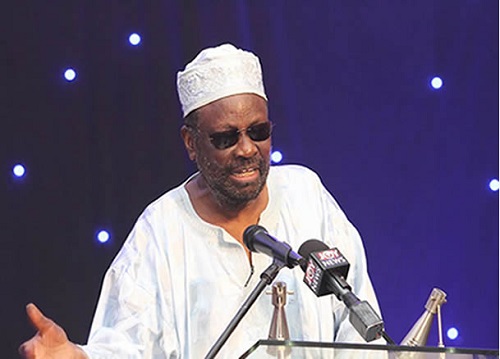ON 16 February, 2022, the University of Ghana, Legon, organised a memorial event for one of its most distinguished products, Emeritus Professor Kwasi Wiredu, former student and Professor of the University, who died in the USA in January 2022, aged 90.
Organised by the Classics and Philosophy department, the remembrance ceremony was held live event in the precincts of the Great Hall of the university, and simultaneously telecast by Zoom on the internet.
Professor Martin Adjei and the department of Philosophy and Classics, Department, organised the event. Tributes were paid to the late Professor Wiredu by Wiredu’s international colleagues, as well as members of his family. It was particularly heart-warming to hear the fond memories of his family. His son, Agyenim Wiredu, hilariously recounted Wiredu’s reply when teased about his being ‘so busy’.
And his daughter, Akua Dwamena Wiredu, narrated stories about the numerous “friends” the professor had around the world, and stories about who used to regale her with.
Professor Wiredu was married to his wife, Mary, for sixty years. They had five children. He taught them to be African, no matter where they were. Akua recalled being told by the Professor, when she was in Class One, that she would no longer be known by her “Christian names”. Henceforth, she was to be Akua Dwamena Wiredu.
“By the way, “he explained, “I myself will from now on, be known as Kwasi Wiredu, not “Johnson Emmanuel Wiredu!” Akua added, “That’s how my father taught me who I am. ..An African.”
Wiredu’s significance on the international philosophical scene was marked by the fact that the obituaries about him included one by the leading French newspaper, Le Monde. Written by Séverine Kodjo-Grandvaux, the Le Monde obituary said:
QUOTE:[Kwasi Wiredu was] “One of the most important African philosophers….
Born in Kumasi in 1931, under British colonisation, Kwasi Wiredu, from a modest family, began his studies in philosophy at the University of Ghana, before joining Oxford, where, in 1960, he defended a doctoral thesis devoted to “knowledge, truth and reason.”
“Then he taught for more than twenty years at the University of Ghana, from 1961 to 1984, before being recruited in 1987 by the University of South Florida, in Tampa, as professor emeritus. Engaged in the debate on the African philosophy of the 1970s,… Kwasi Wiredu [was] the one who most insisted on the need for a “conceptual decolonisation”….
“A specialist in logic, epistemology and analytical philosophy, the author of Philosophy and an African Culture (1980) sought to understand, in line with Bertrand Russell, the influence of the syntax of languages on thought. According to him, linguistic structures ‘influence’ our ways of conceiving reality.
“[But] far from rejecting everything that comes from the West, Kwasi Wiredu [called] for vigilance so as not to tame the African realities of European conceptions. What interested him was, by translating into his Akan mother tongue the concepts and conceptual dualisms that run through the history of philosophy – such as the soul and the body – to distinguish those which have a universal scope from those which are related to the languages in which they are expressed.
“Through numerous articles and his book Cultural Universals and Particulars; An African Perspective (1996), Kwasi Wiredu demonstrated, against a colonial prejudice still tenacious in his time, that African languages can be philosophical languages and that it can be useful – although not always necessary – to ‘exploit the patterns indigenous concepts’.
“In the 1990s, when sub-Saharan Africa opened up to a multiparty system, he designed the African modalities of democracy through the deliberative act. The ‘consensual democracy’ that he advocated supposes that there cannot be irreconcilable social interests, but a primary interest shared by all. Here again, it is a question of finding how to reconcile the one and the plural.
“Kwasi Wiredu was part of all the great philosophical debates that agitated Africa – English-speaking as well as French-speaking – during the second half of the 20th century. And through the textbooks or encyclopedic works he edited – including the invaluable A Companion to African Philosophy (2004) – he worked to promote all the philosophies of the continent and to give African philosophy its full depth, in integrating into its corpus the Islamic, Ethiopian, Egyptian, Greco-Roman heritages.
“And to remember that Origen, Saint-Augustin or Plotinus, for example (who are usually attached to the philosophy of European antiquity, were African. [In other words] Africa has never lived in a vacuum and has always been linked to the rest of humanity.”
BY Cameron Duodu


